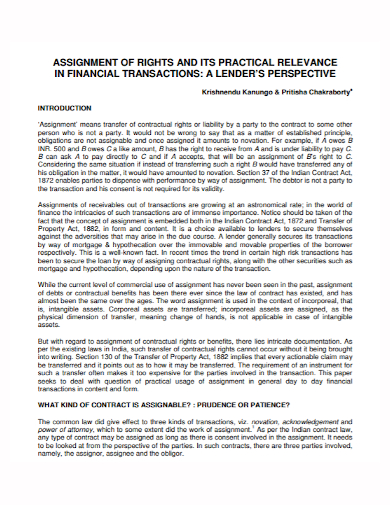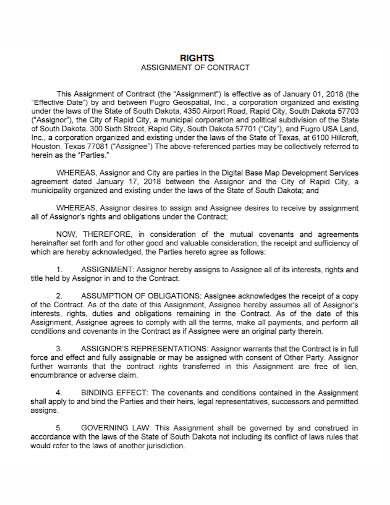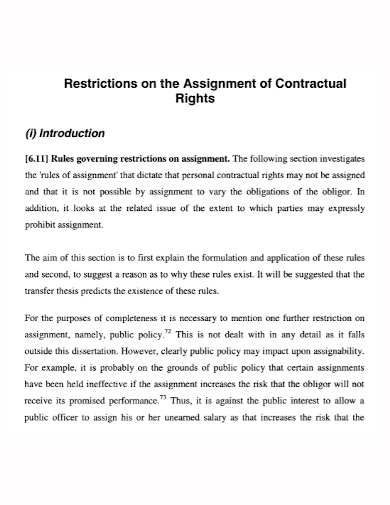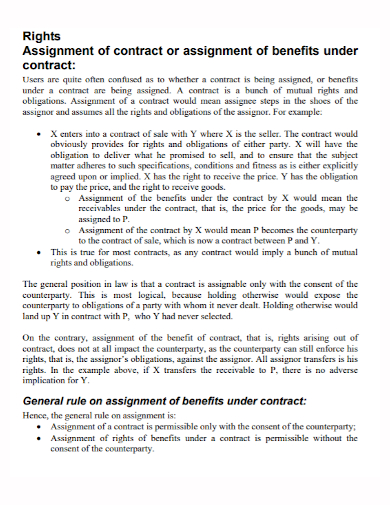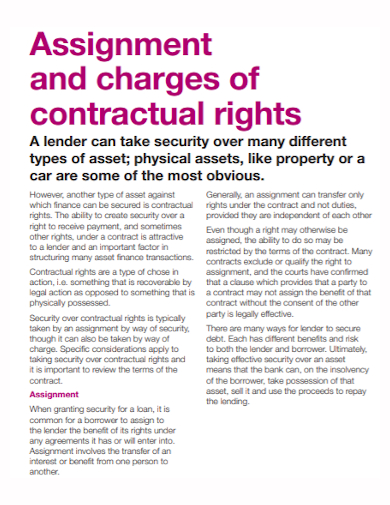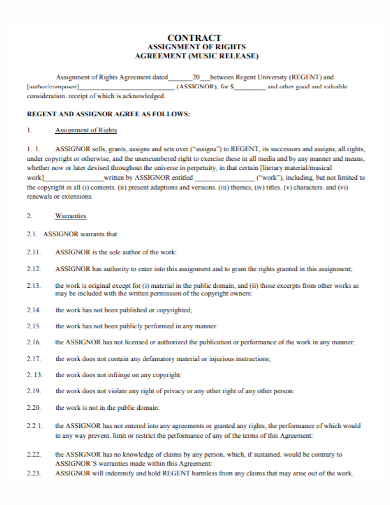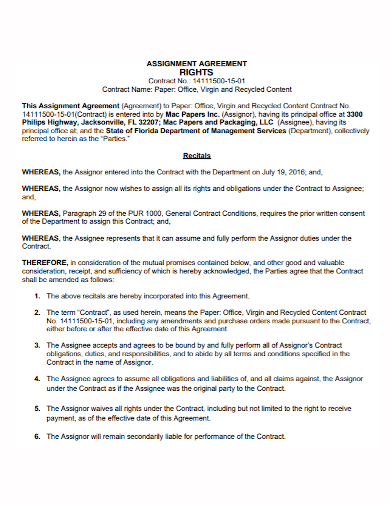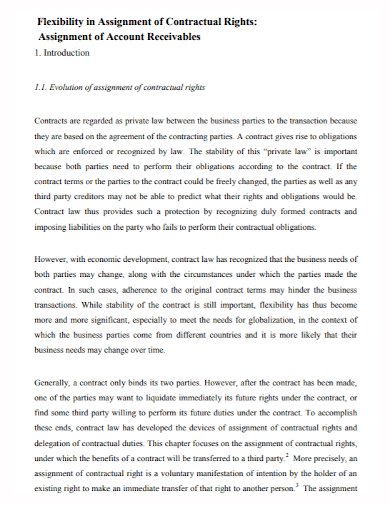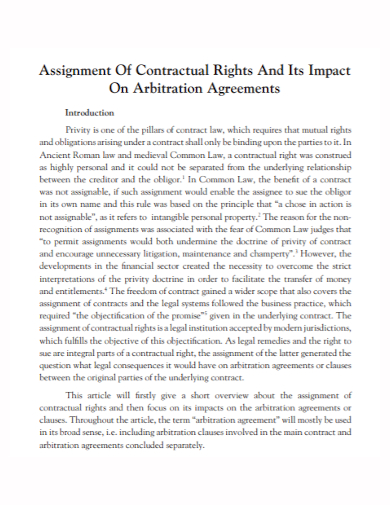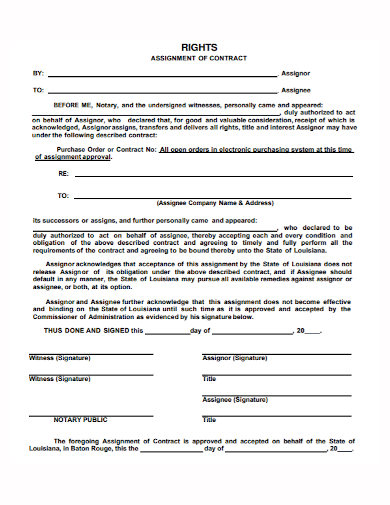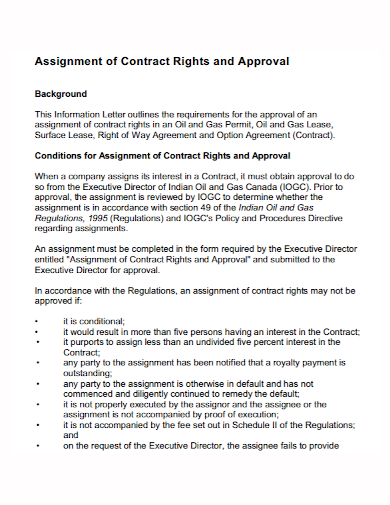A right is transferred from one party to another. For example, as a general rule and subject to the express provisions of a contract, a party to a contract (the assignor) may assign its contractual rights to a third party (the assignee) without the approval of the party against whom such rights are held. Only by novation can obligations be transferred to a third party. A legal assignment or an equitable assignment are two different types of assignments. Assignments can be used in finance transactions to take security over things like action choices.
10+ Assignment of Rights Contract Samples
An assignment of rights agreement describes a circumstance in which one party (the assignor) transfers contract rights to another. The assignee is the person who takes over the rights.
1. Financial Assignment of Rights Contract
2. Assignment of Rights Contract
3. Sample Assignment of Rights Contract
4. Standard Assignment of Rights Contract
5. Assignment Charges of Rights Contract
6. Assignment of Rights Agreement Contract
7. Assignment of Rights Services Contract
8. Account Assignment of Rights Contract
9. Basic Assignment of Rights Contract
10. Company Assignment of Rights Contract
11. Assignment Approval of Rights Contract
Rules of Assignments
Contracts usually include assignments. It’s crucial to remember the following:
- Unless the parties make an agreement to the contrary, the assignor is responsible according to the contract.
- Unless the contract expressly prohibits assignments or unless a special exemption applies, assignments are permitted in practically every type of arrangement.
- To generate the assignment, the assignor does not need to speak with the other contract party.
Exceptions
- A contract can’t be allocated in some cases due to exceptions.
- Personal services agreements, changes to contract duties, and material aspects of the agreement are all examples of unenforceable assignments.
- If you decide to hire a specific professional writer to write a book for you, this is an example of a personal services agreement that cannot be assigned.
- Because you hired that writer to write the book rather than someone else, he or she would not be allowed to accept your cash and then hand the task to another writer.
- Assignments of real property, loans, and debts, for example, must be in writing to be valid.
- For further information on the types of agreements that must be in writing, you should consult the statute of frauds.
Delegations
In terms of what it entails, a delegation is quite similar to an assignment. When a party transfers his or her obligations (or liabilities) under a contract to another party, this is known as delegation. Assignments, on the other hand, entail the transfer of ownership of a piece of property. The earliest party is replaced by a new one in a novation.
Creating an Assignment Agreement
It’s crucial to include information like this in an Assignment Agreement:
- The name of the person who is entrusted with the task (known as the assignor)
- The name of the party assuming rights and duties (the assignee)
- The initial agreement’s opposing party (known as the obligor)
- The agreement’s name and the date on which it expires
- Is the obligor’s approval required before allocating rights under the first contract?
- The obligor’s consent date.
- When will the contract be implemented?
- The contract will be governed by the laws of which state.
FAQs
What is an assignee?
The assignee is the party who receives the contract’s rights and obligations but is not a contract’s original party. An assignee often obtains contract rights and liabilities straight from the contract’s originating party. An assignee might be a person, a group, or a company. All of the assignor’s rights and liabilities generally pass to the assignee after a legal assignment. The assignee steps into the assignor’s shoes. The assignee is now accountable for the contract’s remaining responsibilities, and the contract’s benefits will be distributed to the assignee. When enforcing legal rights under the contract, the assignee will not be forced to go via the assignor.
What is an assignor?
An assignor is a contract’s original party. An assignor might be a person, a group, or a company. The assignor is the party who sells its contractual rights to someone else. This indicates that the assignor transfers both the contractual obligations and the contractual benefits in a contract assignment. This means that the assignor only conveys the contractual benefits in a rights assignment. In either case, the assignor gives the assignment to the assignee.
If you want to see more samples and formats, check out some assignment of rights contract samples and templates provided in the article for your reference.
Related Posts
FREE 14+ Sample Music Concert Proposal Templates in MS Word | Google Docs | Pages | PDF
FREE 10+ Security Guard Contract Samples in PDF | MS Word
FREE 10+ Assurance Agreement Samples In MS Word | Google Docs | Apple Pages | PDF
FREE 10+ Option to Purchase Agreement Samples in MS Word | Apple Pages | PDF
FREE 26+ Curriculum Form Samples in MS Word | PDF
FREE 20+ Cleaning Service Proposal Samples in PDF | MS Word
FREE 29+ Sample Loan Application Form Templates in MS Word | PDF
FREE 10+ Event Venue Contract Samples in PDF | MS Word | Pages | Google Docs
FREE 10+ SBAR Samples in PDF | DOC
FREE 12+ Music Band Contract Templates in PDF | MS Word
FREE 10+ HVAC Maintenance Contract Samples in PDF | MS Word
FREE 10+ Social Media Marketing Contract Samples in MS Word | PDF
FREE 10+ Wholesale Assignment Contract Samples in PDF
FREE 18+ Financial Proposal Samples in PDF | MS Word | Google Docs | Pages
FREE 10+ Feasibility Study Samples in PDF

